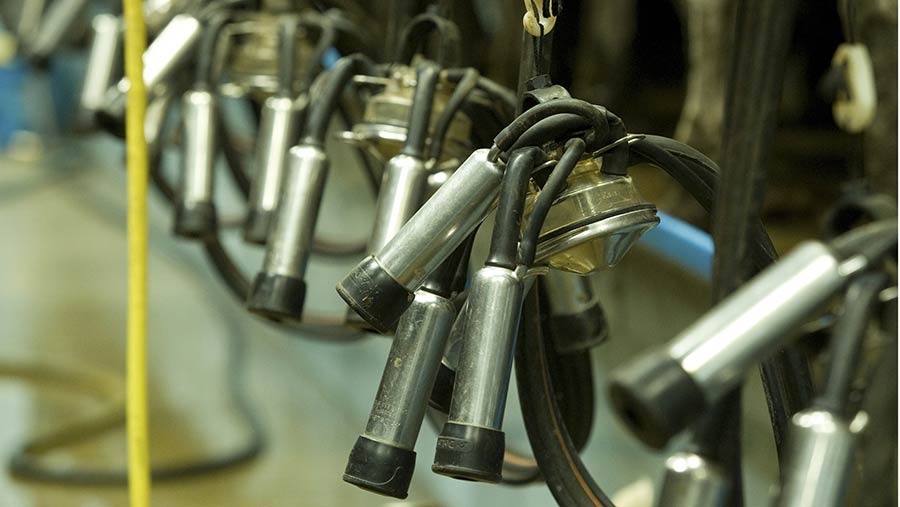Farmers apply to form dairy producer organisation
 © John Eveson/FLPA/imageBROKER/Rex Shutterstock
© John Eveson/FLPA/imageBROKER/Rex Shutterstock A group of 141 farmers has come together to form what could become Scotland’s first dairy producer organisation.
Members of the Milk Supply Association (MSA) have applied to the Rural Payments Agency for approval to be formally recognised as the first EU dairy producer organisation (DPO) in Scotland.
Scottish dairy farmer Rory Christie, chairman of MSA, said he hoped the DPO would be rubberstamped in the first quarter of 2016.
He told Farmers Weekly: “It is a partnership between dairy farmers, MSA and the processors.
“MSA wants to act as the agents of the farmer and negotiate all terms and conditions.
“We want to represent dairy farmers’ views with a democratic mandate. Our group of 141 dairy farmers, based across Dumfries and Galloway and Ayshire, will supply Stranraer-based Lactalis, a global dairy business and the largest European milk processor.
See also: Dairy producer organisations – the principles explained
“We see ourselves as a supply chain solution to get the best possible outcome for our farmers and for the processor.”
Q&A: Producer organisations
What are producer organisations?
Producer organisations (POs) are legally constituted groups of farmers or growers who assist in the distribution and marketing of farm produce.
Why must a DPO receive approval from the Rural Payments Agency?
To enable a DPO to negotiate prices for members’ milk without falling foul of competition legislation, it must attain RPA recognition by constituting and organising its role in accordance with criteria laid down in enabling EU regulations.
Are producer organisations a new concept?
No. They are long-established in the fresh produce sector under the EU Fruit and Vegetable Regime, under which two members of the Scottish Agricultural Organisation Society, East of Scotland Growers and Scottish Borders Produce have been recognised POs for several years.
Why are DPOs necessary?
Following the 2013 reform of the Common Agricultural Policy, in particular deregulation in the dairy sector and the removal of milk quotas, DPOs have been encouraged across Europe.
Mr Christie milks 1,500 Jersey cross Holstein Friesian cows near Port William, south-west Scotland.
He said the formation of the DPO would help him and other dairy farmers to engage with the full length of the supply chain and better manage milk production in a post-quotas era.
“POs offer highly professional farmer representation, a pooled resource to fund that representation as well as the ability to get closer to the market to help farmers manage their volume and the processor to manage his relationship with the farmer,” he added.
“We see this as something that will differentiate us from the rest. Working together is not only better, it is the only way forward.”
Mr Christie heads up the MSA, with a steering committee of five other producers. He enlisted the help of the Scottish Agricultural Organisation Society (SAOS), the federal organisation for agricultural and rural co-operatives in Scotland, to help develop the association to build a collaborative working relationship with Lactalis for mutual benefit.
In total, MSA supplies about 210m litres of milk a year and has worked with Lactalis to develop a new, more sophisticated milk pricing formula which is used as a basis to inform milk price negotiations.
Both parties are also working to develop a new milk contract, which is compliant with the dairy Voluntary Code of Practice, incorporating a fully transparent and fair milk pricing process.
James Graham, chief executive of SAOS, said: “Dairy POs were introduced to improve both transparency and efficiency in the supply chain.
“Dairy farmers and milk processors are entirely interdependent and the formation of a PO enables a properly functioning interface among them.
“I expect to see several more follow the MSA’s example, and I hope their move provides strong encouragement.”
Scottish MEP and agriculture committee member Alyn Smith said: “The EU Milk Package states that member states must recognise producer organisations for the planning of production and co-ordination of supply.
“Formed by producers, a producer organisation can optimise production costs, stabilise producer prices, and respond faster to changes in the market. For example, Fresh Growers brought Chantenay carrots back to the UK and now supplies more than 90% of the domestic Chantenay market.”
“Farmers have traditionally eschewed collective action but attitudes have to change in this world of the modern supply chain and the retail juggernauts.
“I hope to see more DPOs popping up all over Scotland to counter the imbalance of power in the food supply chain, and I will do everything I can to support them in the European Parliament and at home.”
